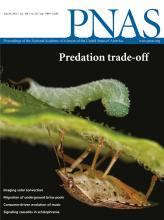Remote control of renal physiology by the intestinal neuropeptide pigment-dispersing factor in Drosophila
Aaron D Talsma, Christo P Christov, Ana Terriente-Felix, Gerit A Linneweber, Daniel Perea, Matthew Wayland, Orie T Shafer, Irene Miguel-Aliaga – 2012
The role of the central neuropeptide pigment-dispersing factor (PDF) in circadian timekeeping in Drosophila is remarkably similar to that of vasoactive intestinal peptide (VIP) in mammals. Like VIP, PDF is expressed outside the circadian network by neurons innervating the gut, but the function and mode of action of this PDF have not been characterized. Here we investigate the visceral roles of PDF by adapting cellular and physiological methods to the study of visceral responses to PDF signaling in wild-type and mutant genetic backgrounds. We find that intestinal PDF acts at a distance on the renal system, where it regulates ureter contractions. We show that PdfR, PDF's established receptor, is expressed by the muscles of the excretory system, and present evidence that PdfR-induced cAMP increases underlie the myotropic effects of PDF. These findings extend the similarities between PDF and VIP beyond their shared central role as circadian regulators, and uncover an unexpected endocrine mode of myotropic action for an intestinal neuropeptide on the renal system.
author = {Talsma, Aaron D. and Christov, Christo P. and Terriente-Felix, Ana and Linneweber, Gerit A. and Perea, Daniel and Wayland, Matthew and Shafer, Orie T. and Miguel-Aliaga, Irene},
title = {Remote control of renal physiology by the intestinal neuropeptide pigment-dispersing factor in Drosophila},
volume = {109},
number = {30},
pages = {12177--12182},
year = {2012},
doi = {10.1073/pnas.1200247109},
publisher = {National Academy of Sciences},
abstract = {The role of the central neuropeptide pigment-dispersing factor (PDF) in circadian timekeeping in Drosophila is remarkably similar to that of vasoactive intestinal peptide (VIP) in mammals. Like VIP, PDF is expressed outside the circadian network by neurons innervating the gut, but the function and mode of action of this PDF have not been characterized. Here we investigate the visceral roles of PDF by adapting cellular and physiological methods to the study of visceral responses to PDF signaling in wild-type and mutant genetic backgrounds. We find that intestinal PDF acts at a distance on the renal system, where it regulates ureter contractions. We show that PdfR, PDF{\textquoteright}s established receptor, is expressed by the muscles of the excretory system, and present evidence that PdfR-induced cAMP increases underlie the myotropic effects of PDF. These findings extend the similarities between PDF and VIP beyond their shared central role as circadian regulators, and uncover an unexpected endocrine mode of myotropic action for an intestinal neuropeptide on the renal system.},
issn = {0027-8424},
URL = {https://www.pnas.org/content/109/30/12177},
eprint = {https://www.pnas.org/content/109/30/12177.full.pdf},
journal = {Proceedings of the National Academy of Sciences}
}

